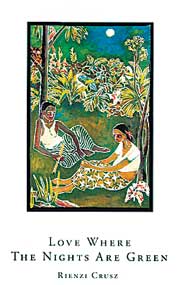“This is all there is and this is everything,” reads the epigraph Rienzi Crusz borrows from Joyce Carol Oates for his latest book of verse. Oates’s bold affirmation of existential plenitude bears out the lush lyricism that animates Crusz’s poetry. For long-time readers of Canadian verse, Love Where the Nights are Green will doubtless recall Irving Layton’s noted anthology of Canadian love poems, Love Where the Nights are Long (1962). However, where Layton’s collection featured a range of voices, Crusz’s is very much his own.
The five sections and more than 50 poems by this self-styled “Sun-Man” shed new light into the “dark antonyms” that inform his poetry: death and desire, ends and beginnings, time and transcendence. Here, love is a “raging chaos.” It “hangs exotic and hard / like a bunch of king-coconuts / on the palm of our dreams.” No “breed of plums,” this. Nature reifies the abstractions of love. In “Karma,” nasals and sibilants choreograph the intimacy of nature, body, and art, so that the “valley bloomed /to new poems / written on olive skins,” while in “Elegy for an Orange” animate and inanimate nature perform a sensual “chemistry of assimilation.” No accident, then, the “green” of the book’s title. It encodes metonyms for fertility, growth, transience, and the élan of a reality pregnant with all-too-many possibilities.
 |
It is indeed in this hybrid hue that the poet inscribes the “dark diaspora” of the immigrant song, knowing only too well that the “sweet inventions of memory” can hardly hope to “restore the omphalos blood / that sang my green days.” But green can also signal loss and decay, the “blur of mould” creeping over the best-man and bridesmaid in an old wedding photo. Yet, in a poem eulogizing his deceased mother, the speaker shows that even the dead live on—“gone and here—in the mindscapes of memory.”
The pomegranate tree of his childhood still seems “always so heavy with promise.” And beauty, too, issues forth from waste, like his mother’s beloved rose fed on “cow-dung, bonemeal and crushed egg-shells.”
Crusz’s sibylline aesthetic intersects the cosmic and the mundane. His poems inhabit liminal, restive spaces. Like the great synthesizers of Christian metaphysics referenced in “Elegy for an Elder Brother”—Augustine, Merton, Teilhard de Chardin—Crusz revels in paradox. He probes religious and ontological questions with the same kind of aching scepticism recently discovered in the letters of Mother Teresa. In “The Chatterbox Lover,” the poet hears nothing nothing but the nothingness of his silence, or, is silence the thunder of his love, the godly ‘no’ to all my worldly desires?
But above all, it’s in the mock-heroic “small martyrdoms” of the immigrant experience that Crusz’s poetry finds a local habitation. Experiences as prosaic as taking out a recycling bin full of “civilization’s broken toys” in sub-zero weather or as raw as parlaying into “one-fifth brotherhood” the racism coded in the “thin pale index finger” that meets the poet’s outstretched hand (in church, no less) illustrate the many-sided toll of diaspora.
And yet, Crusz’s poetics of exile eschews facile antinomies. Elegiac laments for “my beloved country” are tempered by wit, irony, and the joys of the adopted homeland, “this igloo of heaven.” Section 3 likewise begins with a comic reverie of God being smuggled “into my modest bungalow / at 166 MacGregor Cres, Waterloo.” That the poet provides his actual address in a delightful blend of magical realism and wordplay (God turns out to be a dog) suggests that the divine may manifest itself even in the unconditional canine love in a “February winter’s night” in southwestern Ontario. Far from merely signalling postmodern self-reflexivity, the address effectively situates the poetic consciousness in the cosmos itself, mooring the intangible vagaries of the spirit in the hard geometry inhabited by the body. It is hardly surprising then to find among the “mundane favours” the poet prays for in the last poem of the collection his yearning to have his heavenly room “mirror / [his] master bedroom” in Waterloo. The echoed locale and plaintive tone leave little doubt as to where home is.
Having shifted markedly from the lyrical to the epic, the poetic voice will now “Let nostalgia / flirt with hyperbole, interrogating spaces where “new entrances seem / rational, imperative; / old exits survive, ride / the sweet inventions of memory.” Still, rather than dwell on the romanticized travesties and wistful longings that often entangle diasporic narratives, poems such as “Legacy (for Anne)” celebrate the “brown skin,” “the music / and fatted calf of the prodigal story.” With Eliotic overtones, “Roots” insists that “What the end usually demands / is something of the beginning.” Crusz locates this dialectic in the colonial encounter.
Rather than read it as a harbinger of cultural apocalypse, the poet digs deeper. At its root, he finds none other than himself—“I, burgher of that hot embrace” between Portuguese and Sinhalese ancestors, “when two civilizations kissed and merged.” Love, as this resplendent collection suggests, may redeem even history, “the bloody equation.”
“Love Where The Nights Are Green”, published by Godage International Publishers (Pvt) Ltd., is available in the Godage Emporium in Maradana and the Barefoot Bookshop in Colpetty. “Elephant and Ice” and “Singing In The Wind”, published by Perera Hussein Publishers are available at the Barefoot Bookshop.
|

